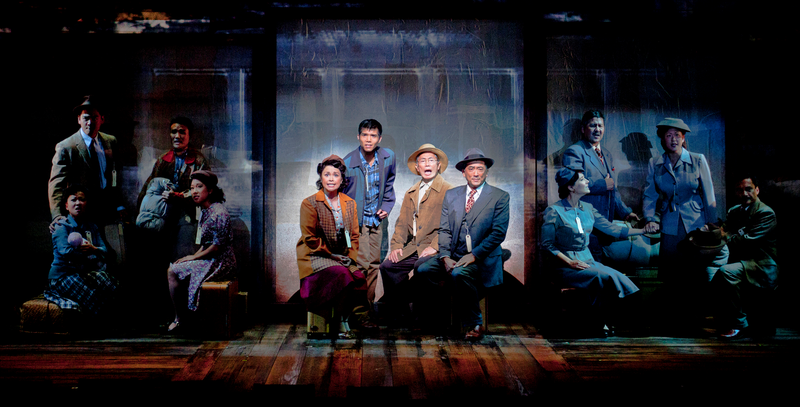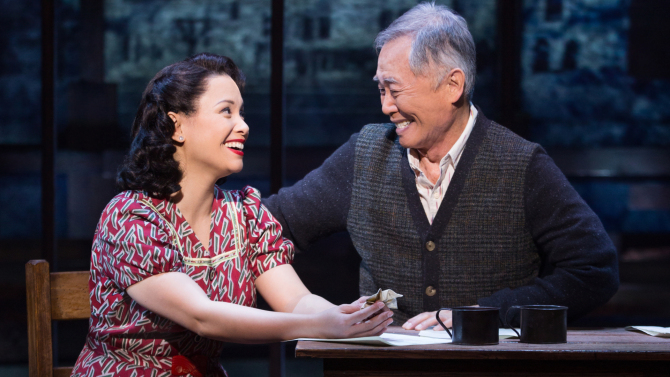By Jazmin Justo
“Allegiance” is a beautiful performance with heart wrenching moments and powerful lyrics. The new Broadway musical “Allegiance” is a musical written by Jay Kuo based on the life experience of actor and social activist George Takei. Having spent a large portion of his childhood in the internment camps, he shares his story in a dramatization of this terrible tragedy in U.S history. Starring Telly Leung as Sammy Kimura and actress Lea Salonga as Keiko Kimura, the show is a great inspiration in today’s troubling times.
The show begins with George Takei trying on his military uniform when he is interrupted by a knock at the door. A lady appears giving Sam a package his deceased sister left behind. The lady informs him of the funeral and then leaves. Sam is left in distress, trying to fight back his memories. The ghost of his sister appears and whisks the audience back to July 1941. We are introduced to Sammy at his teenage years, fresh out of college greeted by his sister, father, grandfather and neighbors. They are in the midst of the celebration of the Tanabata festival with a traditional fan dance, making wishes for a better year. The scene than changes to December 07, 1941, with F.D.R’s famous declaration of war. The family is split in what to do as they are forced to leave their farm and home to the concentration camps. They arrive at Heart Mountain where they suffer through dust storms, high temperatures and constant threats from the guards. Sam, furious about what is happening, attempts to unite everyone together to petition for their basic necessities such as clean blankets, clean drinking water, and cough medicine. During the show, the JACL leader makes appearances of how he tirelessly tries to appeal to different congressmen to let the Japanese Americans free. He then offers the proposal to have the Japanese Americans serve in the army in their own segregated unit to prove their loyalty to the United States. This led to the infamous loyalty questionnaire that led to the tearing apart of families and friends with the question 27 and 28. Actor Michael K. Lee had one of the most difficult tasks in playing the role of Frankie, who leads the draft resistance movement as a fight for his rights and liberties that have been stripped away. because his parents were imprisoned without due process. This part of the show alludes to the actual event in which approximately 300 incarcerated Japanese Americans resisted the draft, Heart Mountain having the larger riots. The ones who resisted were tried, convicted and sentenced to three years in federal prison. The resisters later became stigmatized and shunned within the Japanese community as “No-No boys” as expressed near the end of the play when Sammy refuses to acknowledge Frankie’s draft resistance as a just cause and instead calls him a “traitor”.
After the show, the main cast greeted cheering fans outside and gave autographs along with some selfies. Actor Christopheren Nomura (Tatsuo Kimura) was very kind in giving acting advice to one of the fans in the crowd who came from Japan to study acting in NYC and a little girl aspiring to be a singer. Actor George Takei came out last and shared his sympathies with several few fans who express their gratitude for the show, sharing with him the tales of their relatives who had lived through that painful moment in history. “I’m sorry that she lived through that terrible experience.” he consoled the fan, “It is important for the story to be told because this happened under the U.S Constitution.”



Leave a Reply